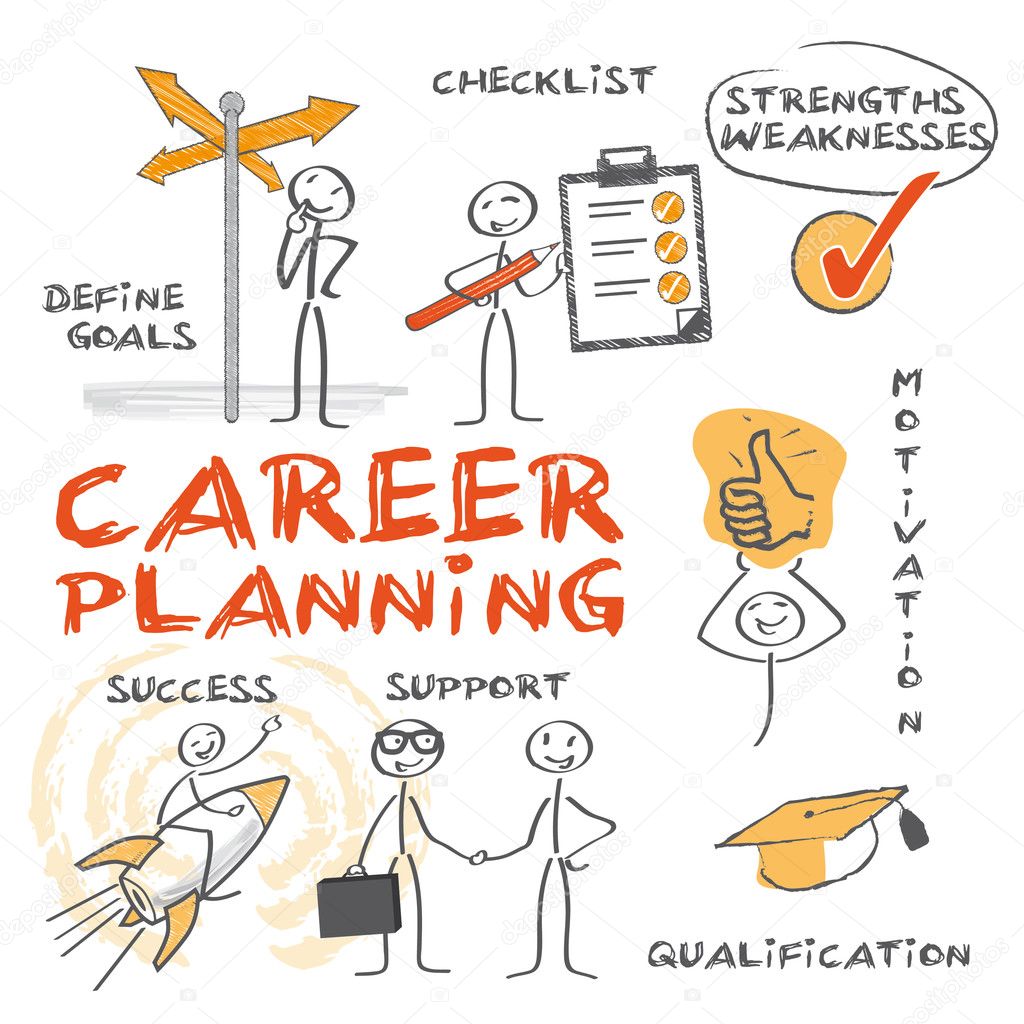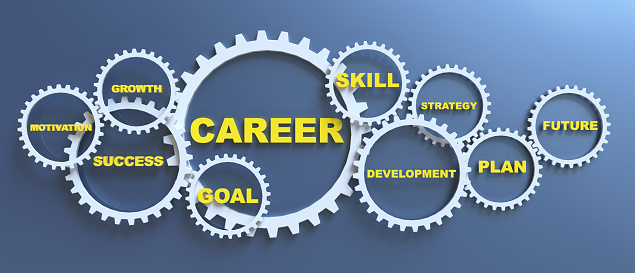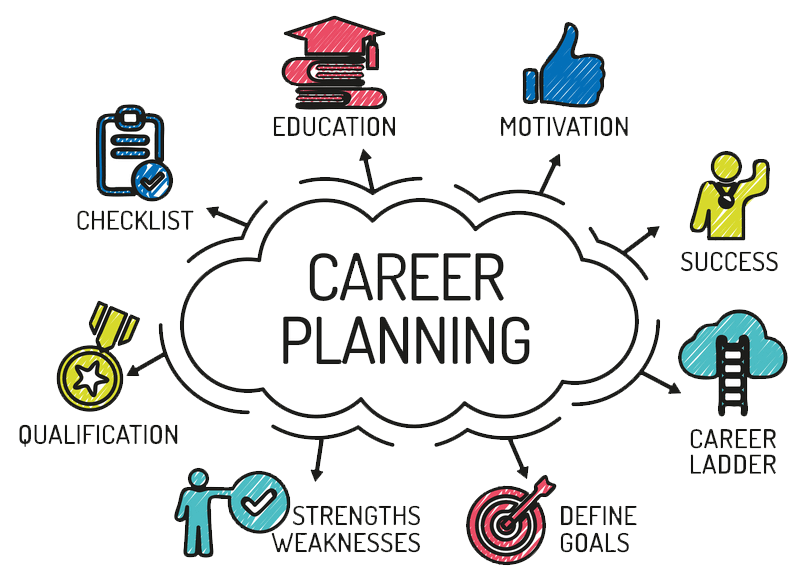For Students
What is career planning?
Admin Sep 02, 2022 01:56 PM

TAGS
Career planning is deciding what you want to achieve in your life and the steps you'll take to accomplish it. Knowing how your skills, talents, values, and interests translate into possible careers or jobs. Career planning includes matching your career goals to your educational and financial needs. Different people can have different takes on career planning and at different stages in life at which they choose to go for career planning. It could be while in high school, choosing your college major or as a professional. However, you could start by contemplating what your skills and values are first. With that foundation, you can start exploring which types of jobs and roles align with your skills and requirements. Career planning can involve assessment tests, support and guidance by career counsellors, professional coaching, educational programs, and occupational training.
Do you have to be at a certain age or stage in life to plan your career?
There is no perfect/right age or time to start planning your career. Ideally, towards the end of high school, you'll know what you want to do. But even if that's not the case, it's okay. College, vocational school, and entry-level positions can provide valuable experience and help you get better clarity of prospects, especially if you are planning to switch streams or professions. You can update your resume and network as you narrow your career choices.
For those who are a few years out of school and are a professional, career planning is an opportunity to reflect on the highlights and challenges of your career to date. Looking at your interest and skill set, what you've already done, and what you'd like to do more is a great place to start.
Whether your age or how long you've been working, investing time in career planning is always beneficial. After all, your plan isn't eternal. As you experience new opportunities and learn more about your field, you might want to change it to reflect your growth.

How do you start career planning?
An effective career plan can help you successfully navigate your professional life, from finding your areas of interest and taking the academic route to the first job of your interest and eventually enjoying a rewarding career that works best with your skill set and interest. With careful assessments of career planning, you can evaluate the field where you would like to make your career and develop a strategic plan for achieving your goals.
The main areas of career planning include your interests, skills, values, and preferences. Interests are the things that you are passionate about or have the curiosity about or desire to be involved with something that would give you a sense of happiness and fulfillment. Even if you weren't paid to do them, you'd want to spend time (and maybe money) to learn more about them. Clues about our interests and skills can often be found in our hobbies or our choice of college major. Scan your bookshelf, browsing history, email subscriptions, and even your apps. Do you notice a theme or area of interest?
Ask yourself a few questions to self-access, like:
- What would I do in my free time?
- What interests me?
- What genre of books would I read or take a class on?
The next important area to consider is your skills. Skills are a set of knowledge, abilities, and experience needed to perform and excel in a job. These can be in-born talents or competency areas you've developed over time through studying or could be job-specific. You can bank upon these traits when you need to get something done.
It may take a little innovativeness to see where you can turn your interests and skills into career options. For example, if you're creative and organized, you might like graphic design, social media or digital marketing, or app development. It's always beneficial to look into something that sparks your interest.
Ask yourself:
- What am I best at?
- What can I do better than others?
- What's something I do for free that others get paid to do?
Once you've determined what you excel at and what interests you, your values will help analyze how you use those talents in the world. Your skill set and values will set you apart and help you make a difference. For example, let's say you want to become a lawyer, but what specialization would you like to go for? Would you want to be a prosecutor, a public defender, a general counsel, or specialize in intellectual property? Do you want to work in criminal justice or environmental crime? The same job title with a specific specialization may find you working with different companies.
Ask yourself:
- What problem am I passionate about solving?
- What makes me sad, happy, or angry?
- Which cause would benefit from my skills and experiences?
Finally, imagine your day at work. Are you driving to work, biking, walking, or just rolling out of bed? Is your dream work environment a big-city skyscraper or a sunny cafe in a town? Does your work keep you occupied, or do you have enough free time to spend with friends and family? Are you earning much money or just enough to live comfortably? These preferences will help you decide which career path will best suit you and the work-life balance you desire and will keep you happy.
Few Steps to an organized Career Planning

Identify organizations that align with your skills & interests
Seven steps to organized career planning establishing long-term goals for your career can feel overwhelming. Once you have an action plan ready, it can fast-track the process of choosing the most suitable career path for you. It's worth taking the time to note your ideas on a paper (or somewhere you can see them).
Self-evaluation -Self-assessment is the stepping stone career planning process. The questions in the section above are a great way to start. However, you can also take a professional personality or aptitude test, like Whole Person Assessment. You may also find core values and interests assessment worthwhile exploring how to integrate your values and career. Consulting a coach or a career counsellor is also a great way to gain insight into your strengths and interests. This will further help you find professions where you might thrive in. Ensure you take enough time for self-exploration in this first step, or you may find yourself dissatisfied with your career decisions later.
Research your dream job- Be bold with your goal-setting at this stage in the process. In a perfect career scenario, what would you do for a living? Do some research and a job search you want to have. Read the job description, paying close attention to the skills and responsibilities required for the position. What educational qualifications are needed for the job role? What kind of companies are hiring for the role you are looking at? Be mindful that there would be many jobs and titles you've never heard of, so talk to many people and stay open-minded. Look on LinkedIn and read the profiles of people who post interesting and relevant content. You may be surprised to see people getting paid for various skills you are aware of but might possess.
Determine the basic steps- There is generally never one right path to your dream job, but there may be certain steps that are non-negotiable. For example, attending medical school and earning a degree is mandatory to become a doctor. What are the non-negotiable short-term goals for your role, and what would be your road map from where you are? Will you need to go back to school or switch professions?
While you're researching open job roles, look at the companies that are posting the jobs. Do you see yourself working in these organizations? What organizations (nonprofits, startups, Fortune 500) appeal to you the most? What kind of perks, healthcare facilities, and salaries do they offer? The company profile might be more important than their title or role for some people. For some, the industry or the organization's mission might be of more importance. It's a good question to ask yourself what matters to you and why? Look at job openings on the grass root level.
Once you have a fair idea of the role and responsibilities and companies you're looking to work towards, look at other roles in the same department. If, for example, you aim to work at a Director level in an IT company, look at the other open positions — especially any that may report directly to the director. What's the easiest process for you to progress in an organization? It might be an entry-level position on the help desk — or it might be a coordinator or a mid-level role, depending on your experience, qualification and fulfillment of the role requirements.
Take the next right step.
Identify which short-term goals get you closer to the job that you want. You may want to start by applying to training or graduate school if it represents a career change. If it's just the next step in a field you're already in, you may have to start sending out your resume. Discuss your goals with your manager if you love the company you're with but are ready for a new role. They can assist you in developing a professional development strategy and beginning to take on additional responsibilities.
Let everyone know about it.
The process of career preparation ends with hiring as much assistance as you can. Inform everyone at brunch, including your manager and coach, that you want to advance. While outmoded career advice would have you hide your goals, it is a cliche that the grease goes to the noisy wheel. Besides, many people love to help others, especially if they get to give advice or showcase their connections. Networking and showing your commitment to growth are critical to your career planning development.
Some additional tips to help
Once you've set your sights on that snazzy new job title, you'll probably be excited to start making it a reality. The seven steps in career planning outlined here will give you an excellent foundation. However, you can do a few other things to help you take the next step.

Here are a few career planning ideas:
- Volunteer. Even if it might be difficult to find paid job in your field, you can still gain experience. Offer to work part-time as a volunteer for a cause that supports your objectives. If you're trying to work with nonprofit groups, this is very effective.
- Confer with your college. Alumni networks are typically found at universities, honour societies, and professional schools. Contact them or the company's career centre. Typically, they can point you in the correct path; some might even provide financial assistance or assistance with job exploration.
- Send internship applications. Look for chances to collaborate with organisations and people you respect. Even brief internships can offer beneficial learning opportunities and networking contacts. Additionally, you'll be the first to find out about any brand-new full-time employment positions.
- Hone your abilities. Returning to school can be a fantastic option, but it's not the only method to pick up new skills. Consider signing up for online courses and certification programmes that fit your job objectives. When you're prepared to apply, demonstrating your dedication to learning new abilities can make you stand out.
- A crucial step is reviewing and updating your résumé. If it's been a while since you were actively seeking employment, you might want to take a look at your CV. Update it with your most recent positions, credentials, and accomplishments. After looking it through, you might want to get a second opinion by showing it to a friend or a professional resume writer. Ask them to participate in a practise job interview or read a sample cover letter for you. Their comments can help you land your next position.
- Start your own business. If you have the necessary skills, you could wish to start off by freelancing in your new industry. It's a fantastic approach to start pursuing your ideal position while maintaining the stability of your present employment. Simply confirm if moonlighting is permitted with your human resources department.
- Create a network of professionals. Attend seminars and networking gatherings. Join the appropriate industry-specific professional associations and browse their employment boards. Boost your LinkedIn profile, and if you're feeling brave, connect with people in the industries and professions you're interested in and request informational interviews. Keep in mind that the individuals you work with are important contributors to your network. Keep your relationships intact when it's time to go on.
Start right away
Nearly 25% of the average person's time is spent at work. Our interactions and experiences at work are more crucial than anything else. Your career, in large part, decides how happy you are. It's worth taking the time to plan a short career and set a course for a successful, happy life.
Search
Latest Blogs

Exploring Opportunities in Emerging Engineering field
Admin
Dec 14, 2024 05:18 PM

Navigating College Majors
Admin
Sep 25, 2024 04:04 PM

Tools for Measuring Strengths For Career
Admin
Sep 25, 2024 03:27 PM
Interested in getting latest updates?
SUBSCRIBE


















